Mitt Romney's campaign is beginning to close the gap on Barack Obama in the increasingly important digital race to engage and mobilize voters through the internet.
Romney has been vastly outspent and out-gunned on digital outreach, with Obama spending at least twice as much on online advertising as his Republican contender.
But observers of the 2012 election cycle have begun to notice a subtle but potentially significant shift in fortunes. They point to some measures of interactive engagement with voters which suggest the president's advantage is far smaller.
Take Facebook. Obama has 27 million supporters who "like" his Facebook page, dwarfing Romney's less-than-two million by a ratio of 14 to 1. Yet the gulf between the candidates is much smaller when calculated in terms of the number of people sharing and commenting on their Facebook wall posts – 640,000 for Obama and 240,000 for Romney, or less than three to one.
More than 60,000 people on Facebook have "liked" the latest Romney post demanding a repeal of so-called Obamacare. The most popular post on Obama's Facebook page in the last week, on equal pay, only marginally tops that with 70,000 endorsements.
The same pattern is seen on Twitter, where Obama has 30 times as many followers as Romney. But according to the Romney campaign, recent tracking shows that each official tweet from the Republican candidate is retweeted 608 times, almost on a par with the 750 retweets for every official Obama message.
The success the Republicans are having in generating social media interest around the presidential race has not gone unnoticed among Democratic circles. One prominent strategist for a left-leaning online consultancy told the Guardian that the figures were "terrifying".
Despite these early encouraging signs for the Republicans, they still have a mountain to climb. A new study by the social media analytics company Socialbakers looked not just at the candidates' wall posts but at sharing right across Facebook, and found that Obama was still dominant.
Last month he generated almost five times as much social media buzz on Facebook than his rival.
But Romney's key digital strategists believe their efforts are beginning to reap rewards and make up some ground following months where they were at a natural disadvantage. While the Republicans were engaged in the long and bitter primary battle, Obama was able to build up his campaign team in Chicago without distraction.
By 29 May, when Romney finally clinched the Republican nomination, Obama had amassed a total campaign team of 750 staff including scores of data analysts and programmers to Romney's meager 87, according to Romney advisers.
"I give nothing but credit to the Obama folks who run a very successful programme with a very large staff that we are always amazed by," Zac Moffat, digital director of the Romney campaign, told the Personal Democracy Forum this week. "In size they are clearly ahead, but in terms of engagement, no, they are not. There are a lot of indicators that suggest we are creating the campaign that we need to be successful in November."
Over the past few years political campaigns have come to lean increasingly on digital technology and 2012 has been described as the first presidential election cycle where "big data" is front and centre of the race. Both main parties have compiled databases storing the personal details of millions of potential voters – allowing them to micro-target their messages in the hope of raising money, encouraging volunteers and eventually getting people to the polls on November 6.
The Obama re-election campaign, Obama for America, has been lauded for being at the forefront of digital innovation. But the Republicans have been more savvy at applying technology than they have been given credit for, and there is a sense that Obama's digital supremacy may have been overplayed. As far back as 2004 George Bush's staff could access the Republican party's data on voters and volunteers online in real-time – a facility that the Obama campaign made a top priority this cycle.
"You don't get a data advantage overnight," said Chuck DeFeo, the eCampaign Director for the Bush-Cheney re-election campaign in 2004. "The Democrats have had longer to build, but it's not like the RNC has been sitting still."
The chief digital wizard for the Romney campaign is Moffat, who has been in the position since the moment when the former governor of Massachusetts entered the race in 2007. He is an experienced organizer and data expert, having founded Targeted Victory, one of a handful of consultancies in the US that specialise in micro-targeting online advertising to specific geographical, demographic and interest groups.
Moffat believes that targeted online advertising is becoming more and more crucial to any successful political campaign. "This is not a question of if but when. This is going to be the first cycle in which persuasion through digital paid media becomes a core part of the election process," he said.
Moffat has latched on to recent surveys that show that in any given week one in three adult Americans do not watch any live television other than sport. He calls that group "off-the-grid", pointing out that they are immune from a traditional political campaign's main weapon – TV attack ads.
In the crucial swing state of Ohio, the proportion of off-the-griders rises to 40%.
"Our entire consumption habits are changing. But many of the powers that be who determine TV ad buys don't seem to know this," Moffat said.
Though Moffat is encouraged by recent signs of healthy online engagement with voters, he Under Moffat, the Romney campaign has unashamedly copied many of the tricks developed by the Obama team, albeit customising them for a conservative audience.
Obama supporters were invited to enter a $3 lottery to have dinner with the Sex and the City star Sarah Jessica Parker; Romney aped the idea, inviting his supporters to enter a $3 lottery to have dinner with Donald Trump.
The campaign is even using new digital tools that were created by Obama engineers in 2008. Optimizely, a tool that allows web developers to test different page configurations to see which is the most effective in raising money and energising voters, was developed by an Obama engineer, Dan Siroker, in 2008; it is now being commercially leased to the Romney campaign.
Like the Obama re-election effort, Mitt Romney's digital operation encourages voters to engage with them by signing on through the campaign's online volunteer centre using Facebook and Twitter. That allows the campaign to amass huge quantities of personal data on individuals, which it can then use to hone its messages back to them – a form of micro-targeting that is hugely more sophisticated than in previous iterations.
Messages can be fine-tuned by age, neighbourhood, voting history and interests of each single potential voter. This cycle campaigns are micro-targeting individuals by interpreting their consumer and online histories - determining who to hit and how to hit them using thousands of data points. Recent Romney online ads, include ones directed at mothers and at golf fanatics.
Despite the similarities, there are important differences of emphasis between the two camps. Unlike the Obama campaign, which has amassed a massive digital team numbering more than 100, the Romney campaign "has built an army of consultants," says the Republican Governors Association's director of digital strategy, Matt Gagnon.
That reflects Romney's own style as a former management consultant. "Romney is a consultant, and is numbers-driven. He's comfortable leaning on the private sector," Gagnon said.
The use of contractors extends to Moffat's own company, Targeted Victory, which has so far been paid $2.5m out of Romney's election warchest.
When it comes to demographics, Romney's Facebook following is dramatically different from Obama's. The most popular age group following Romney, according to Facebook's "likes" metrics, is 45 to 54 years. Obama's is 18 to 24 years.
That may give Obama the edge with youth, but older citizens are more likely to vote. Obama's largest Facebook following is located in Chicago – his home town – whereas Romney's Facebook base is in Houston, Texas.
To what extent engagement through social media will translate into votes in November is unknown. Both presidential campaigns are keeping mum over the number of volunteers actively making calls and going door to door, making it impossible to know whether such interaction can be channeled into real political capital upon which the final result may depend.
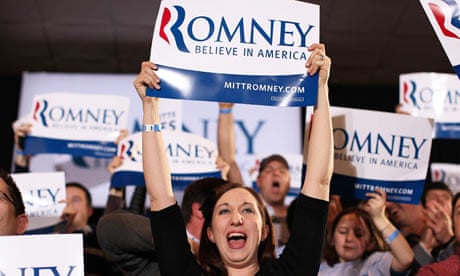
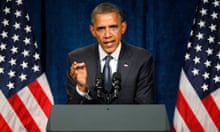
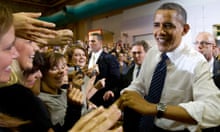

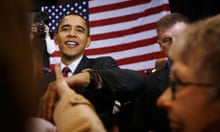
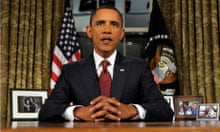
Comments (…)
Sign in or create your Guardian account to join the discussion